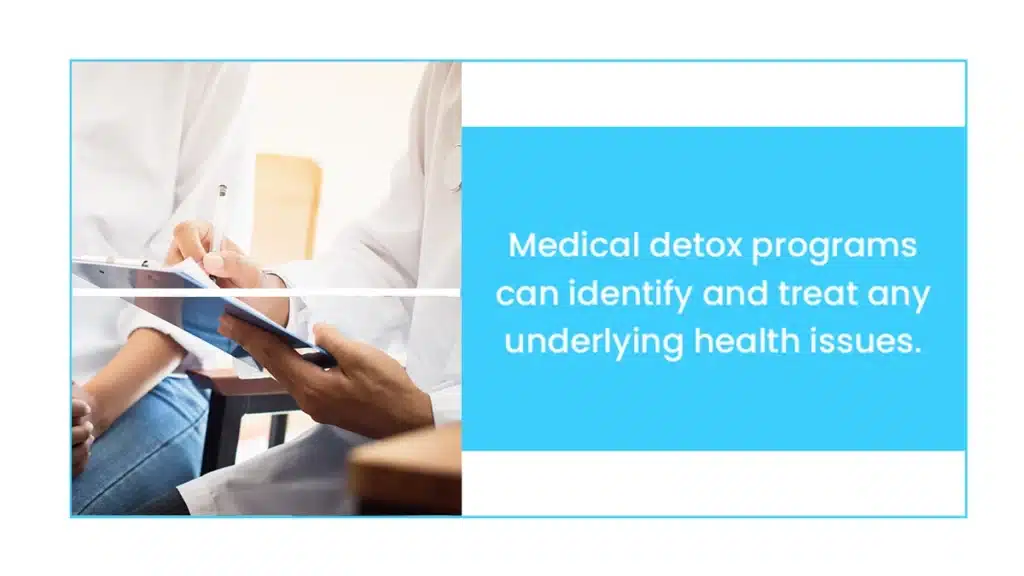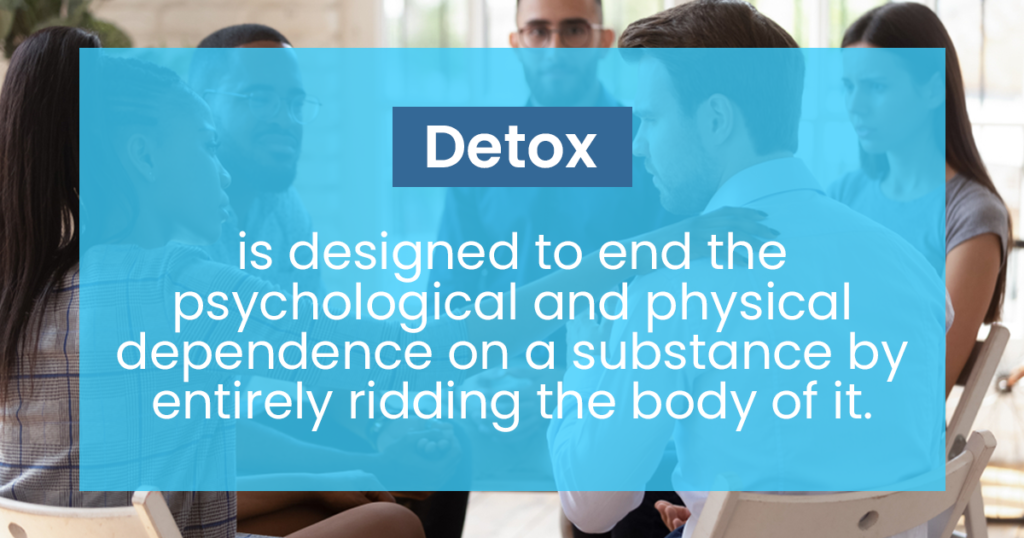Alcohol and drug abuse can significantly harm your mental and physical well-being over time. Consistent use can throw your body off balance, requiring the substance to function properly every day. You may begin to feel a psychological and physical withdrawal as soon as you quit taking drugs or consuming alcohol.
The human body is constantly adapting to the amount of the substance put into the body, building up what is called tolerance. Each time you drink alcohol or use the same drug, it will require more and more of it to experience the same effects as before. You feel psychological and physical withdrawal as soon as you quit taking drugs or alcohol when you have a substance use disorder.
Detox is designed to end this psychological and physical dependence on a substance by entirely ridding the body of it. This process is one of the very first steps in addiction treatment.
No matter what substance you are addicted to, experiencing uncomfortable withdrawal symptoms is all a part of the detoxification process. The severity and duration in which you experience these symptoms can depend on the addictive substance you were using and how much. A detox takes the toxic substances of alcohol and drugs out of your body, and there are even specific detox diets to help you recuperate from harmful substances.
Starting your recovery process with detox will help prepare you for most treatment programs and evidence modules. You will begin counseling and other treatments during your time in the detox center. You will also have access to medical and nursing services.

Withdrawal Symptoms During Medical Detox
Withdrawal symptoms often appear 6 to 12 hours after the user has ceased drinking, which signals the start of the detox process. Those who use a substance more heavily are more likely to experience more severe withdrawal symptoms.
During the early stages of detox, the following symptoms and indicators may be present:
- Sweating.
- Nausea/vomiting.
- Headaches.
- Weight loss
- Anxiety/Tremors.
During the first 24 hours of alcohol detox, users may suffer hallucinations separate from delirium tremens. After quitting drinking, the first 24 to 48 hours are the riskiest for seizure occurrences. Detoxing in a secure and pleasant environment like a rehabilitation center with around-the-clock medical supervision can be a great way to ensure safe alcohol or drug detoxification.
Withdrawal symptoms and delirium tremens can linger for up to a week during a body detox, which is longer than the standard 72 hours.
- The degree of a person’s addiction is one element that affects how long it takes to detox.
- Individual’s age, together with any concurrent physical or mental health problems
- Foreground Detoxification (how often a person has gone through detox).
- A history of alcohol withdrawal-induced convulsions or delirium tremens
Detoxification protocols for Drugs
- The first step is making the decision to stop using drugs or alcohol and seeking therapy.
- Your treatment team will meet you upon arrival and give you medical permission for admission.
- At all times, your general health and well-being will be monitored
- Your medical requirements are taken into account when needed. You will be facilitated when treatment and medication are administered.
- Our team will ensure that you are comfortable and safe throughout the process.
A Safe Environment for Detox
Medically supervised detoxification programs also offer high-quality therapeutic care in a discreet setting. It’s unsafe to detox at home. Trying detox on your own might impair you or make the situation worse. Clean, safe, and supportive environments are where a patient feels most comfortable.
Treatment of Co-Occurring Disorders
Co-occurring mental disorders are common among those addicted to drugs or alcohol. Medical detox programs can identify and treat any underlying health issues. Since alcohol and drugs work by boosting serotonin and dopamine levels, and when these levels drop, so does the person’s mood.
This negative mood causes the individual to ingest more of the substance to escape feeling this way. A constant cycle of this quickly leads to long-lasting mental disorders such as depression or anxiety. Detox can help identify these mental issues and treat them through therapy so that you are less likely to relapse in the future.

Frequently Asked Questions
What does a detox do to your body?
When generally taken into account, detoxification cleans the blood; it removes all the impurities caused by drugs or alcohol. It takes all the harmful toxins from the kidneys and liver, helping you recover.
What comes out of your body when you detox?
When the detoxification is in the beginning, it can excrete residue material from your body, such as urea, uric acid, creatinine, dead skin cells, and toxins.
Is it safe to detox?
Detoxing for alcohol or drugs at home or on your own is not recommended as it requires administration from a medical professional. It is recommended to remove these toxins with the help of a detox treatment center that monitors you 24/7.
What is detox, and can I make my own?
The liver is where toxins are present, so you need to get help from medical detox to purify your bloodstream.
Haven Detox Offers Personalized Medical Detox Plans
At The Haven, we provide a safe and comfortable environment for your medical detoxification. Our team of dedicated medical professionals will monitor you around the clock for a safe withdrawal process. Detox, effective behavioral therapies, and carefully prescribed medicine are all a part of our addiction treatment at The Haven. Call us for more information at (561) 328-8627.






